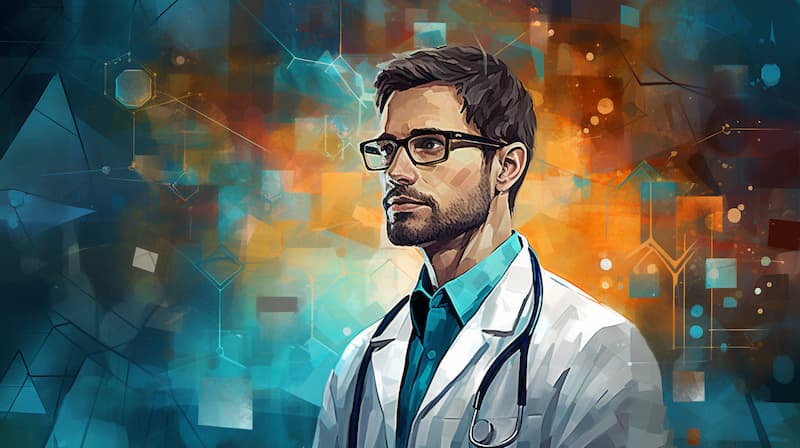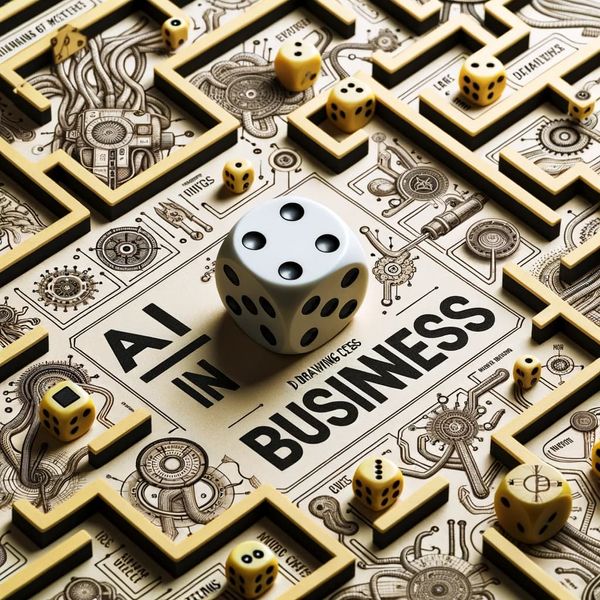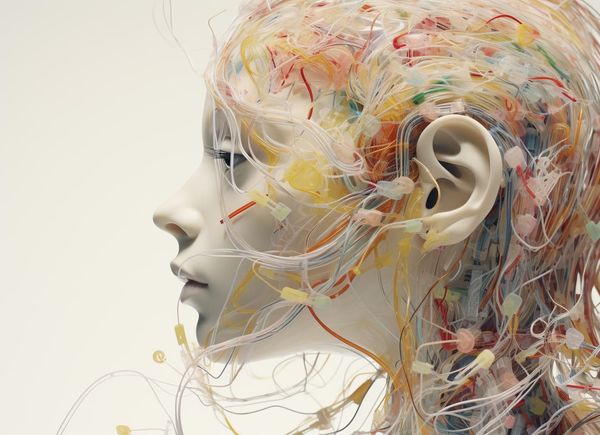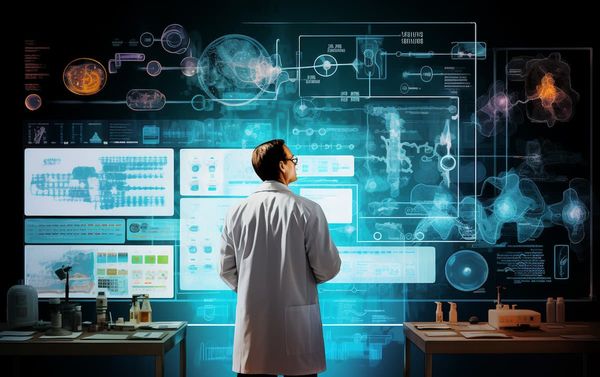It was once commonplace for medical professionals to seek answers to challenging medical quandaries within the confines of a pocket-sized medical reference book. Such reliance on memory and a keen analytical mind used to be the backbone of medical expertise. However, the emergence of artificial intelligence (AI) in the medical field seems to be shifting this narrative, leading to questions about the role of human expertise and the changes AI might bring to medical practice. Let's explore these issues further.
The Dawn of AI in Medicine: Unmatched Potential or Unsettling Dystopia?
The future of medicine is being shaped by the promise of AI's unparalleled capabilities. Its potential to take over tasks such as writing medical notes, communicating with patients, and offering diagnoses is seen as the path to a new era in medicine.
There is a palpable excitement about the potential of AI in medicine, which includes the possibility of an electronic scribe penning down daily patient notes, saving significant time for the busy practitioner. AI's ability to carry out complex tasks such as reading X-rays and recognizing intricate patterns, sometimes with better precision than a seasoned doctor, can revolutionize medical practice.
Despite such exciting prospects, the medical fraternity has been relatively slow to adopt these innovations. A part of this reticence is the necessity for new technology to be thoroughly tested before gaining the trust of practitioners, but another aspect is the romanticized concept of the human diagnostician, a concept that AI threatens to upend.
AI: A Blessing or a Curse in Disguise?
AI has a lot to offer. For instance, the use of AI in reading electrocardiograms (ECGs) can unearth information far beyond what an expert cardiologist might be able to. Moreover, AI systems can predict a patient's biological age based on ECG patterns, offering insights that a human clinician may never discover.
However, the introduction of AI in everyday medical practice raises some pressing questions. If doctors start relying on AI for diagnoses, could this end up hampering their diagnostic skills? If they've never had to deal with complex symptoms to arrive at a diagnosis, would their understanding of the diagnostic process suffer?
Furthermore, the use of AI in drafting patient notes could pose challenges. While it might save time, notes are more than a mandatory chore; they offer a chance to review data and consider the next steps for a patient. The fear is that offloading this task to AI may result in lost opportunities for critical thinking and decision-making.
The Delicate Balance: AI and Human Expertise
In the age of AI, medical expertise could take on a new meaning. The expert might not necessarily be a reservoir of information, but someone skilled at synthesizing, communicating, and using judgment to make difficult decisions.
AI could be a tool aiding this process without replacing the essential human aspects of medical practice, like empathy, understanding, and personal connection.
The medical profession's soul resides not only in the accuracy of diagnoses but also in the empathy, communication, and personal touch that doctors bring to their practice.
Balancing the Scales of Efficiency and Empathy
From diagnosing diseases based on complex patterns to drafting patient notes, AI can accelerate many of the time-consuming tasks that doctors grapple with. However, we must remember that efficiency is just one side of the healthcare coin. The other side is empathy — a uniquely human quality that AI, in its current form, cannot replicate.
Efficiency: AI's computational prowess can dramatically speed up numerous healthcare processes. By harnessing AI's ability to sift through vast quantities of data quickly, we could identify patterns and reach diagnoses that might elude even the most experienced human practitioners.
Empathy: While AI might excel at pattern recognition and data synthesis, it lacks the empathetic touch that doctors provide. The comfort provided by a doctor's reassuring words, the understanding shown in times of distress, and the intuitiveness of a seasoned practitioner when faced with an unconventional symptom — are elements of the 'human touch' that AI cannot replicate.
Blending of AI and Human Expertise
How do we ensure that the introduction of AI into healthcare enhances rather than erodes the vital human elements of medical practice? Here are some thoughts:
- Collaborative Decision-Making: Instead of replacing human decision-making, AI should assist it. Doctors can leverage AI's data analysis capabilities to inform their diagnoses, but the final decision should remain with the human physician who can incorporate factors that AI might not consider, such as patient's lifestyle, emotional state, and preferences.
- Defining Clear Roles: There should be a clear distinction between tasks that AI can take up and tasks that require a human touch. Routine and data-intensive tasks such as scanning medical records or interpreting test results can be delegated to AI, while tasks involving patient interaction, empathy, and judgement should remain with healthcare professionals.
- Training for the New Era: Medical education must evolve to incorporate the skills doctors will need in the age of AI. This includes understanding how to work with AI systems, interpret their outputs, and maintain the human connection with patients in an increasingly tech-driven environment.
The Challenge: Testing AI Systems
A major hurdle to integrating AI in medicine is testing these systems. The standard randomized clinical trials, which could take years, might not be the best fit for testing rapidly evolving technologies like AI. By the time the trial ends, the technology may have undergone several upgrades.
The Trouble with Traditional Methods
The essence of a randomized clinical trial lies in its rigorous design and extended duration. These trials could take years to complete, assessing the impact and reliability of new treatments or drugs. However, AI technology, marked by constant evolution and iterative improvements, may outpace the timeline of a traditional trial. The technology tested at the beginning of a trial could be obsolete or significantly altered by the end, rendering the results less applicable.
Possible New Testing Approaches
Recognizing the limitations of traditional testing approaches, we must envision innovative strategies to validate AI systems in healthcare. Here are a few ideas:
- Rapid Testing Frameworks: Develop testing frameworks that can keep pace with the rapid advancements in AI technology. These could involve real-time evaluation, continuous monitoring of system performance, and iterative feedback loops that help refine AI systems.
- Simulated Patient Scenarios: Use of simulated or hypothetical patient cases to test the AI's diagnostic ability. These can include a wide range of medical scenarios, from simple to complex, allowing an evaluation of the AI's capabilities across a spectrum of conditions.
- Parallel Testing with Human Experts: Run AI diagnoses in parallel with human medical experts, comparing their conclusions. This approach will not only test the AI's accuracy but also identify cases where AI may bring novel insights or overlook crucial human elements.
The Ethics and Regulations Conundrum
The testing of AI systems in healthcare is not merely a technical challenge but also a profound ethical and regulatory issue. We need to address concerns about patient privacy, data security, and informed consent. The regulations for testing and validation must ensure that AI systems adhere to the highest ethical standards.
A Collaborative Effort
The effort to test and validate AI in healthcare should be a collaborative one, involving AI developers, healthcare providers, regulators, ethicists, and patients. Each stakeholder brings a unique perspective that can guide the design of an effective and ethical testing process.
Embracing the Inevitable
AI in healthcare is not a question of 'if' but 'when.' It is imperative we advance our strategies for testing these systems. In doing so, we'll ensure that AI becomes a reliable partner in healthcare, offering the potential to significantly improve patient outcomes and democratize access to high-quality care. As we embrace AI's possibilities, we must remain cognizant of the challenges ahead, including the pivotal question of how we can ensure these technologies are robustly tested and validated for the safety of all patients.
As we march into an era where AI stands ready to revolutionize medical practice, we must recognize that it's not about choosing between human expertise or AI. Instead, the focus should be on how to best integrate these two aspects to improve medical care. Embracing AI as a tool to augment our abilities while maintaining the human touch that defines the essence of being a doctor could be the way forward. AI can reshape the future of medicine, but it will never replace the irreplaceable human element at the core of medical practice.








